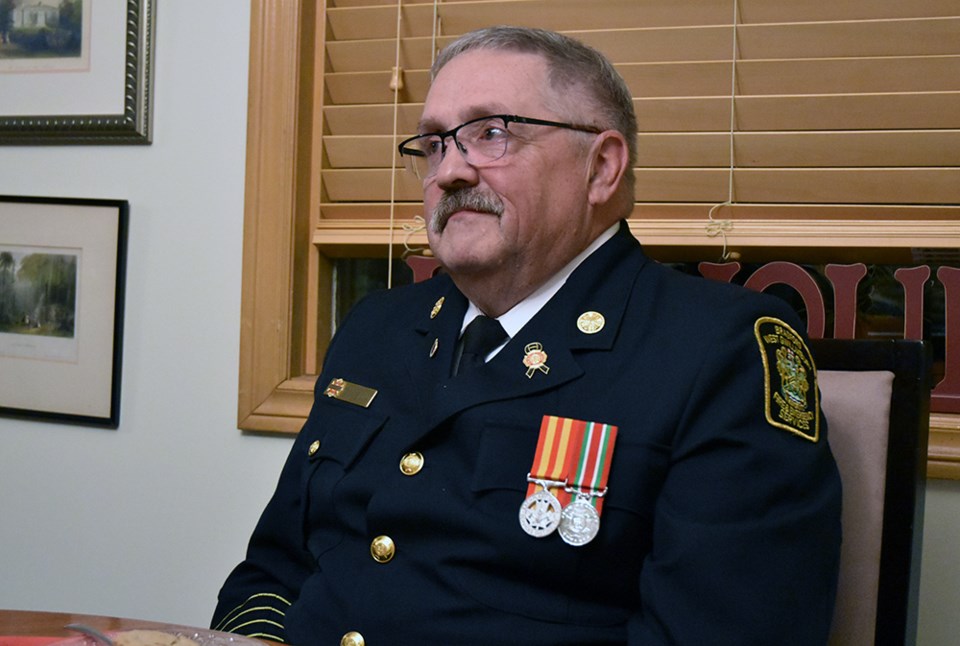The theme of a recent Bond Head Women’s Institute meeting was safety — a message delivered by guest speaker, Bradford West Gwillimbury Fire Chief Kevin Gallant.
Gallant, a firefighter for nearly 30 years, arrived at the meeting after a 36-hour stint at the scene of a structure fire in the Holland Marsh — a fire, he said, underlined the importance of working smoke detectors.
On Nov. 15 at about 12:30 a.m., BWG Fire and Emergency Services received a call about a fire in a residence on River Road. It’s an area also covered by King Fire and Emergency Services, and Bradford firefighters arrived on a scene of near-tragedy.
“We probably came the closest we’ve ever been to having four fatalities,” Gallant said.
Four residents only escaped by smashing a bedroom window to get out. They were taken to hospital where they were treated for non-life-threatening injuries.
“Nobody talked about hearing working smoke alarms,” said Gallant. “It’s so important… I just find it amazing, in this day and age, we’re still going to fires and there are no working smoke alarms.”
According to the home owner, there were multiple working smoke detectors, but they were just slow to sound.
Alarms — smoke detectors, carbon monoxide detectors — are still the first line of defence, although the rules have changed governing their placement.
Detectors should be placed on all levels of a home, and in the hallway outside of sleeping areas. New changes to the building code now require every bedroom in new homes to have a smoke detector installed, he said.
Gallant noted there are even ‘smart’ detectors, that will send an alert to a smartphone if triggered.
He urged residents to contact the fire department if in doubt about the proper placement of detectors — “and if your smoke detector (or carbon monoxide detector) goes off in your house, call 911,” and firefighters will respond.
“Please give us a call. We’re here to serve the public,” he said.
At the meeting, Gallant was questioned about growth in BWG, and how his department is keeping up.
Along with a fire chief, the department has 19 full-time firefighters, 35 volunteers, two fire prevention officers, two administrators and a deputy fire chief, to serve a population of approximately 37,000 people, and protect hundreds of millions of dollars in infrastructure.
“It’s definitely been a challenge,” said Gallant, who has worked in BWG since 2009, first as deputy chief and then chief.
When he first arrived, the fire service was not operating 24 hours a day, seven days a week. “On the weekends, it was the volunteers,” he noted.
In 2010, Gallant persuaded BWG council to approve the addition of three full-time firefighters, allowing the department to create four full-time shifts, offering 24-7 full-time coverage.
The idea was that there would be four full-timers at the station during a shift, reducing response times. Health and safety standards require a minimum of four firefighters on a truck before it can leave the station.
With the full-timers, “when the alarm comes, the guys are on the truck,” and out the door within minutes, Gallant explained.
If additional trucks are needed, the volunteers are paged, but it can take time for them to arrive at the station — longer in bad weather “if they have to chip the ice off the windshield” — and suit up.
That’s one reason why Gallant is pushing for the hiring of additional full-time firefighters, to cover overtime, statutory holidays, sick days and vacation time that may reduce the full-time complement, as well as the purchase of updated equipment.
“You need the equipment, you need the manpower,” plus reciprocal agreements with neighbouring fire departments to ensure that residents are protected, he said.
Firefighters are called out for smoke alarms and carbon monoxide alarms, working fires, motor vehicle collisions, medical calls — including, Gallant said, “babies being born in the front seat of cars.”
Although dispatch tries to provide details, and fire trucks are now equipped with iPads that provide updates in real time, fire crews may not know exactly what to expect. That’s why the first truck out of the hall is the pumper, equipped with hoses, water and rescue equipment, including the ‘jaws of life.’
And although technology is constantly improving, Gallant reminded Women’s Institute members that when calling from a cellphone, the exact location may not come up, although dispatch may be able to triangulate using the nearest cell towers.
“If you’re calling on a cellphone, you’ve got to know where you are.”
Bradford is growing. With three retirement homes under construction, new development at Highway 400, and million-dollar homes, it is a challenge to keep up and be prepared, he said.
“The problem is, firefighting and trying to get things in place is very expensive,” Gallant acknowledged.
The Women’s Institute members asked questions, shared stories, and tips — including one endorsed by Gallant: if an appliance, battery charger, etc., is not in use, unplug it. Batteries left in chargers can short circuit, or items tossed on top of appliances can accidentally hit the ‘on’ switch and start fires.
“Just unplug it!” said Gallant.


